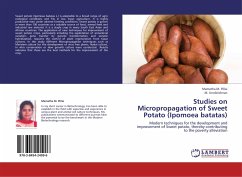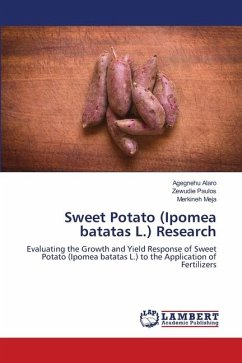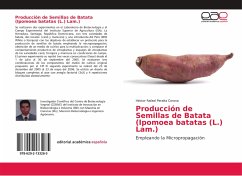Sweet potato (Ipomoea batatas L.) is adaptable to a broad range of agro ecological conditions and fits in low input agriculture. It is highly productive even under adverse farming conditions. Sweet potato is grown in more than 100 countries as a valuable source of food, animal feed and industrial raw material. It is a staple crop in many South East Asian and African countries. The application of new techniques for improvement of sweet potato crops, particularly including the exploitation of somaclonal variation, gene transfer by genetic transformation and somatic hybridization, requires the control of plant regeneration from tissue cultures. In this study different Micropropagation techniques such as Meristem culture for the development of virus free plants, Nodal culture, In vitro conservation or slow growth culture were conducted. .Results indicates that these are the best methods for the improvement of the crop.
Bitte wählen Sie Ihr Anliegen aus.
Rechnungen
Retourenschein anfordern
Bestellstatus
Storno


![Diversity analysis of Sweet Potato (Ipomoea batatas [L.] Lam) Diversity analysis of Sweet Potato (Ipomoea batatas [L.] Lam)](https://bilder.buecher.de/produkte/57/57009/57009757n.jpg)

![Analiz raznoobraziq sladkogo kartofelq (Ipomoea batatas [L.] Lam) Analiz raznoobraziq sladkogo kartofelq (Ipomoea batatas [L.] Lam)](https://bilder.buecher.de/produkte/63/63981/63981168m.jpg)
![Analyse de la diversité de la patate douce (Ipomoea batatas [L.] Lam) Analyse de la diversité de la patate douce (Ipomoea batatas [L.] Lam)](https://bilder.buecher.de/produkte/63/63973/63973530m.jpg)

![Analisi della diversità della patata dolce (Ipomoea batatas [L.] Lam) Analisi della diversità della patata dolce (Ipomoea batatas [L.] Lam)](https://bilder.buecher.de/produkte/63/63956/63956260m.jpg)
![Analyse der Diversität der Süßkartoffel (Ipomoea batatas [L.] Lam) Analyse der Diversität der Süßkartoffel (Ipomoea batatas [L.] Lam)](https://bilder.buecher.de/produkte/63/63981/63981221m.jpg)